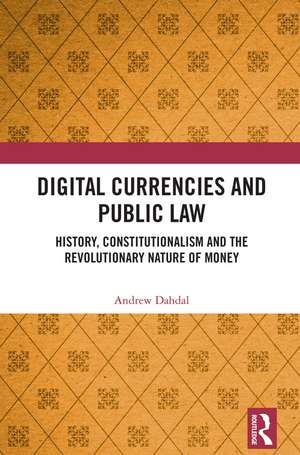Digital Currencies and Public Law: History, Constitutionalism and the Revolutionary Nature of Money
Autor Andrew Dahdalen Limba Engleză Hardback – 30 sep 2024
No contemporary issue is more widely acknowledged and less understood than that of digital currencies. The voice of constitutional scholars, however, is crucially missing from prevailing digital money discourses. Private law scholars are grappling with the legal questions raised by digital currency models in property and contract. Public law scholars, by contrast, have yet to appreciate the significance of the moment. The challenge of understanding the technical dimensions of digital money innovations has obscured the potential constitutional revolution digital currencies represent. This book proceeds from the proposition that ‘money’ is best conceived as a constitutional phenomenon. When seen as such, it becomes clear that changes in the nature of money represent changes in political and constitutional arrangements. Explaining how, and in what ways, those changes will take place is the primary focus of this book. Through an examination of historical episodes where the nature of money has been linked to renewed constitutional settlements, this book distils a core set of principles linking aspects of monetary innovation such as technical control of the money supply to constitutional positions such as executive fiscal accountability. From these principles, a conceptual framework is proposed that translates the specific attributes of digital currency proposals into the language of constitutional dynamics.
The book will be of interest to students, academics and practitioners with an interest in the law of digital currencies, constitutional law and politics.
Preț: 1002.36 lei
Preț vechi: 1222.39 lei
-18% Nou
Puncte Express: 1504
Preț estimativ în valută:
191.81€ • 205.10$ • 159.92£
191.81€ • 205.10$ • 159.92£
Carte tipărită la comandă
Livrare economică 17 aprilie-01 mai
Preluare comenzi: 021 569.72.76
Specificații
ISBN-13: 9781032614564
ISBN-10: 1032614560
Pagini: 238
Ilustrații: 10
Dimensiuni: 156 x 234 mm
Greutate: 0.51 kg
Ediția:1
Editura: Taylor & Francis
Colecția Routledge
Locul publicării:Oxford, United Kingdom
ISBN-10: 1032614560
Pagini: 238
Ilustrații: 10
Dimensiuni: 156 x 234 mm
Greutate: 0.51 kg
Ediția:1
Editura: Taylor & Francis
Colecția Routledge
Locul publicării:Oxford, United Kingdom
Public țintă
PostgraduateCuprins
Introduction
1. The Origins of Money and the Foundations of State Control
2. Coinage, Credit and the Financial Revolution
3. The Revolutionary Nature of Money in British North America and the American Republic
4. The Revolutionary Nature of Money in Chinese, Islamic and Late Colonial History
5. The Political Economy of Monetary Forms
6. Currency Forms and Constitutional Principles: The ‘Money Matrix’ Model
7. Applying the Money Matrix Model to Traditional and New Monetary Forms
8. Conclusion
1. The Origins of Money and the Foundations of State Control
2. Coinage, Credit and the Financial Revolution
3. The Revolutionary Nature of Money in British North America and the American Republic
4. The Revolutionary Nature of Money in Chinese, Islamic and Late Colonial History
5. The Political Economy of Monetary Forms
6. Currency Forms and Constitutional Principles: The ‘Money Matrix’ Model
7. Applying the Money Matrix Model to Traditional and New Monetary Forms
8. Conclusion
Notă biografică
Andrew Dahdal holds a Ph.D. from the University of New South Wales, where he received an outstanding achievement award in 2014 for his dissertation on the necessity of historical analysis in constitutional interpretation. Currently an associate professor in the College of Law at Qatar University, Andrew has also taught constitutional and commercial law within Australia and Europe in both full-time and adjunct roles. Writing on law, technology and global legal frameworks, Andrew is now focused on exploring the intersections between private and public law specifically by exploring the technocratic connections between constitutional and commercial legal frameworks.
Descriere
This book supports the deeper engagement of public lawyers in digital currency developments which threaten dramatic changes in the relationship between individuals and government authorities. It will be of interest to students, academics and practitioners with an interest in the law of digital currencies, constitutional law and politics.
